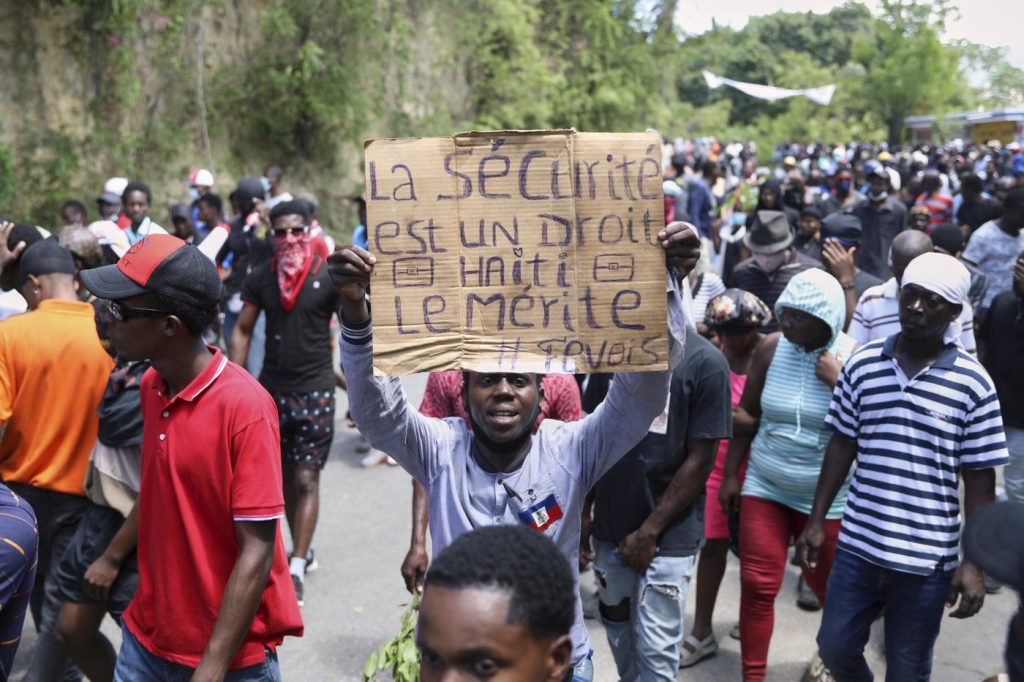PORT-AU-PRINCE, Haiti (AP) — The head of Haiti's transitional presidential council, Fritz Alphonse Jean, announced on Thursday new measures to combat the increasing gang violence that has made the country "hell for everyone." This statement came shortly after gunfire erupted in Port-au-Prince as thousands of protesters clashed with police, calling for an end to the pervasive gang-related crime.
The protest, which marked the largest demonstration since the council's establishment one year ago, occurred outside the offices of the council and the prime minister. Jean addressed the crowd, acknowledging the distress and suffering of the Haitian people. He stated, “Haitian people, you’ve spoken, and we’ve heard you. We understand your misery. We know your pain and your suffering.”
According to the United Nations, more than 4,200 individuals were reported killed in Haiti from July to February, with an additional 1,356 injured. The recent surge in gang violence has displaced over 60,000 people in a single month, further exacerbating the humanitarian crisis. Diego Da Rin, an analyst with the International Crisis Group, emphasized the protesters' frustration as they intentionally marched toward key government buildings.
Jean's address came on the anniversary of the political agreement that created the transitional government's framework. However, cohesion among the political factions that supported this government has significantly waned, and calls for a change in leadership have intensified. Despite these concerns raised by both the public and the international community, the council has not taken significant actions to address them.
During the speech, Jean highlighted specific neighborhoods afflicted by gang violence. He lamented the hardships endured by Haitians, stating, “You lost your homes, you lost your businesses, you lost your jobs, they raped you, they raped your kids. The criminal gangs killed a lot of people.” He invoked Haiti's history as the world's first free Black republic to galvanize support from the citizens against gangs, urging them to reject any recruitment efforts by criminal organizations.
Jean announced the council's commitment to implementing "important measures" to address the violence. These measures include allocating a special budget and incorporating agents from the state environmental group, known as BSAP, into law enforcement efforts. He stressed the urgency of these actions, declaring, “We are telling everyone in this government that we are at war.” However, he did not disclose specifics regarding the budget allocation or the number of BSAP agents to be deployed in the fight.
Looking ahead, Jean mentioned that the electoral council is preparing for Haiti's first general elections in almost a decade, aiming to establish new leadership once the transitional council's term concludes on February 7 of the following year. Haiti has been without an elected president since the assassination of former President Jovenel Moïse in July 2021, during which gangs have gained increasing power.
In 2022, a United Nations-backed mission led by Kenyan police was deployed to assist local authorities with gang violence. However, the mission has faced challenges due to being understaffed and underfunded, with only around 40% of the 2,500 personnel intended for the mission currently present.
Throughout his speech, Jean underscored the transnational aspects of Haiti's security crisis, linking local gang problems to broader issues like money laundering and drug trafficking that extend beyond the country's borders. Da Rin suggested that by framing Haiti's gang violence as a part of a larger transnational crime issue, Jean aims to garner international support for additional security assistance as the threats in Haiti escalate.










